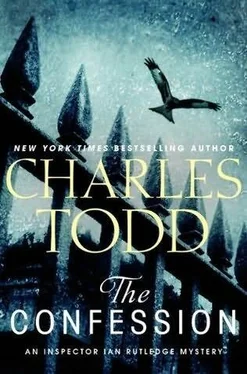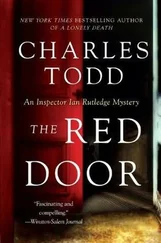Charles Todd - The Confession
Здесь есть возможность читать онлайн «Charles Todd - The Confession» весь текст электронной книги совершенно бесплатно (целиком полную версию без сокращений). В некоторых случаях можно слушать аудио, скачать через торрент в формате fb2 и присутствует краткое содержание. Жанр: Полицейский детектив, на английском языке. Описание произведения, (предисловие) а так же отзывы посетителей доступны на портале библиотеки ЛибКат.
- Название:The Confession
- Автор:
- Жанр:
- Год:неизвестен
- ISBN:нет данных
- Рейтинг книги:5 / 5. Голосов: 1
-
Избранное:Добавить в избранное
- Отзывы:
-
Ваша оценка:
- 100
- 1
- 2
- 3
- 4
- 5
The Confession: краткое содержание, описание и аннотация
Предлагаем к чтению аннотацию, описание, краткое содержание или предисловие (зависит от того, что написал сам автор книги «The Confession»). Если вы не нашли необходимую информацию о книге — напишите в комментариях, мы постараемся отыскать её.
The Confession — читать онлайн бесплатно полную книгу (весь текст) целиком
Ниже представлен текст книги, разбитый по страницам. Система сохранения места последней прочитанной страницы, позволяет с удобством читать онлайн бесплатно книгу «The Confession», без необходимости каждый раз заново искать на чём Вы остановились. Поставьте закладку, и сможете в любой момент перейти на страницу, на которой закончили чтение.
Интервал:
Закладка:
He found the barn with no difficulty and was able to drag one of the doors open wide enough to back his motorcar inside, pulling it nearly shut in front of the bonnet. And he stood there in the narrow opening, keeping watch.
The rank smell behind him was a mixture of damp, rotted manure, musty hay, mildewed floorboards, and bird droppings. Smothering a sneeze, he listened to Hamish’s voice echoing through the rafters as a startled dove flapped away through a gaping hole in the roof.
He understood what Hamish was saying, that following Cynthia Farraday’s motorcar was unlikely to work, that the Yard could find her more readily. But could it? And once lost, the opportunity might not arise again.
It was nearly half an hour before two motorcars came down the road. In the first one he glimpsed Cynthia Farraday’s profile, strands of light brown hair whipping around her face. And in the second, he could make out the white shirt of the man who had greeted her at the landing.
He gave them a five-minute head start before going after them. They had already made the turning toward London by the time he reached it, and he had to drive faster than the rough road allowed before he sighted both motorcars in the distance.
It was not easy to keep up with the two of them as traffic increased on the road and an overladen lorry pulled out in front of him. At his next sighting, the man was ahead. He thought they were playing tag, one and then the other taking the lead, which kept them occupied but made it more difficult to follow them.
Hamish said, “It was a foolish notion.” His voice was gloating.
But Rutledge was patient, overtaking another lorry as soon as he could. On his left, the River Thames flowed in golden glory as the sun moved lower in the western sky. Ahead he could just begin to see the tower of St. Paul’s when the man, with a short blare of his horn, turned off toward the north.
The motorcar driven by Cynthia Farraday continued through the dingy outskirts of London, where industry belched black smoke above their heads. And then she was threading her way through even dingier streets, where barrows and handcarts were a danger to motorcars and themselves. As he watched she narrowly missed a barrow boy who had ignored the warning tap of her horn. He shouted imprecations in her direction, fist raised, then turned to glare at Rutledge as he passed.
He nearly lost her in the swirl of traffic around St. Paul’s but then caught up with her again by guessing which direction she might have taken. Finally they were in a maze of streets in the West End, where it was easier to keep her in sight and harder to hide himself behind other vehicles. Houses here were handsome, taller, and grouped around small fenced squares. It was a part of the city Rutledge knew well from his days as a constable with the Metropolitan Police, new to the force and eager to prove himself.
Cynthia Farraday turned left from the main road, and he recognized the square. Belvedere Place, with its tiny rectangular garden surrounded by tall white houses with dark mansard roofs. Spring bulbs had long since given way to perennials in full summer bloom. It was a fashionable address.
He paused some thirty yards from the entrance to the square, waited five minutes, and then drove slowly past Belvedere Place, searching for the Farraday motorcar.
And he saw it, stopped in front of a house at the far end of the square. Number 17, he thought as he kept going.
It took him ten minutes to find a constable. He was patrolling several streets away, but Rutledge was fairly certain the man would know the answer to his question. Showing his identification, Rutledge asked the man if he knew the name of the household at number 17, Belvedere Place.
Constable Prettyman frowned. “Aye, that would be the Raleigh family, sir. Mother, father, four girls. Staff of five. Is there anyone in particular you would be wanting to know about?”
“A Miss Farraday.”
“Indeed, sir. I don’t believe there’s anyone by that name in Belvedere Place. But of course she could be visiting the family, right enough. Shall I make inquiries, sir?”
“No. Thank you.” He could hear Hamish in the back of his mind. Nodding to the constable, he drove on, reversing at the first opportunity and returning to Belvedere Place. As he reached the corner, he looked for the Farraday motorcar at the far end of the square.
But it had gone.
Rutledge swore, then found himself laughing.
Cynthia Farraday had outwitted him.
He had no idea when she had discovered that he was following her-he had been damned careful!-but he thought it must have happened shortly before she turned into Belvedere Place, when his was the only motorcar in sight, even though he had stayed well back.
And that, he thought, must mean that she had a reason to cover her tracks.
W hen he reached the Yard, he set Sergeant Gibson the task of locating Cynthia Farraday and Wyatt Russell.
“I thought Mr. Russell was dead in Gravesend,” Gibson reminded him.
“So did I,” Rutledge answered grimly. “But it appears the man is actually one Ben Willet.”
“But he said-”
“I’m aware of what he said. The question now is, where is the real Mr. Russell? And was Willet even telling the truth about a murder in 1915?”
“It could explain why this man Willet was killed. He’d come to the Yard with what he knew. Even if it was muddled, like.”
But from what Rutledge had been able to discover in Furnham, it wasn’t clear whether the two men’s paths had ever crossed during the war. Then how had Willet learned about what Russell had done? More to the point, why should it matter to him? And why the charade?
“Find Russell, and we could have a few answers.”
He thanked Gibson and walked on down the passage to his own office. The Duty Sergeant had already informed him that Chief Superintendent Bowles was not on the premises, “his being called to a murder scene in Camdentown.”
It was a reprieve of sorts, offering Rutledge an opportunity to think through the problem before having to present it to his superior. Bowles was not noted either for patience or for understanding. He demanded answers without a thought given to the difficulty involved in finding them. And Rutledge had already had a taste of the man’s hasty interpretation of information brought to him.
He sat down at his desk and turned his chair so that he could look out the window, his view blocked by trees in leaf. They cast cool shadows across the pavement as the sun settled in the west.
River’s Edge was isolated and had stood empty for upwards of five years. A perfect site for a quiet murder. Perhaps it had already seen one. Mrs. Russell.
He thought again that it would have made more sense if Willet had come to the Yard to confess to murdering her.
The question was, had Ben Willet been killed because of the past-or for something else completely unrelated to his visit to Scotland Yard? He wouldn’t have been the first-nor the last-man to have a finger in too many pies.
Hamish said, “D’ye believe the woman, that she wished to purchase yon estate?”
“It was a sound enough reason to explain her trespassing. I’d have said yes, it was the truth-until she played that game in Belvedere Place. If she had nothing on her conscience, she wouldn’t have cared whether I discovered where she lived or not. But what does she have to do with a footman from Thetford who washed up in Gravesend?”
He set himself the task of finishing the paperwork waiting on his desk, but his mind kept coming back to the riddle of Ben Willet.
Mrs. Brothers had recognized his face but couldn’t put a name to it. That would say that Willet could have come home to Furnham from time to time, but not often enough for Nancy Brothers to know who he was. And the men in The Rowing Boat had been reluctant to identify Willet in the photograph. True, Barber’s father-in-law was dying, and the family had no wish to upset him with the news of his son’s death. But was that another convenient lie? One that the man from Scotland Yard could investigate for himself, and then accept at face value? If so, the people in that village held a poor view of the police.
Читать дальшеИнтервал:
Закладка:
Похожие книги на «The Confession»
Представляем Вашему вниманию похожие книги на «The Confession» списком для выбора. Мы отобрали схожую по названию и смыслу литературу в надежде предоставить читателям больше вариантов отыскать новые, интересные, ещё непрочитанные произведения.
Обсуждение, отзывы о книге «The Confession» и просто собственные мнения читателей. Оставьте ваши комментарии, напишите, что Вы думаете о произведении, его смысле или главных героях. Укажите что конкретно понравилось, а что нет, и почему Вы так считаете.












